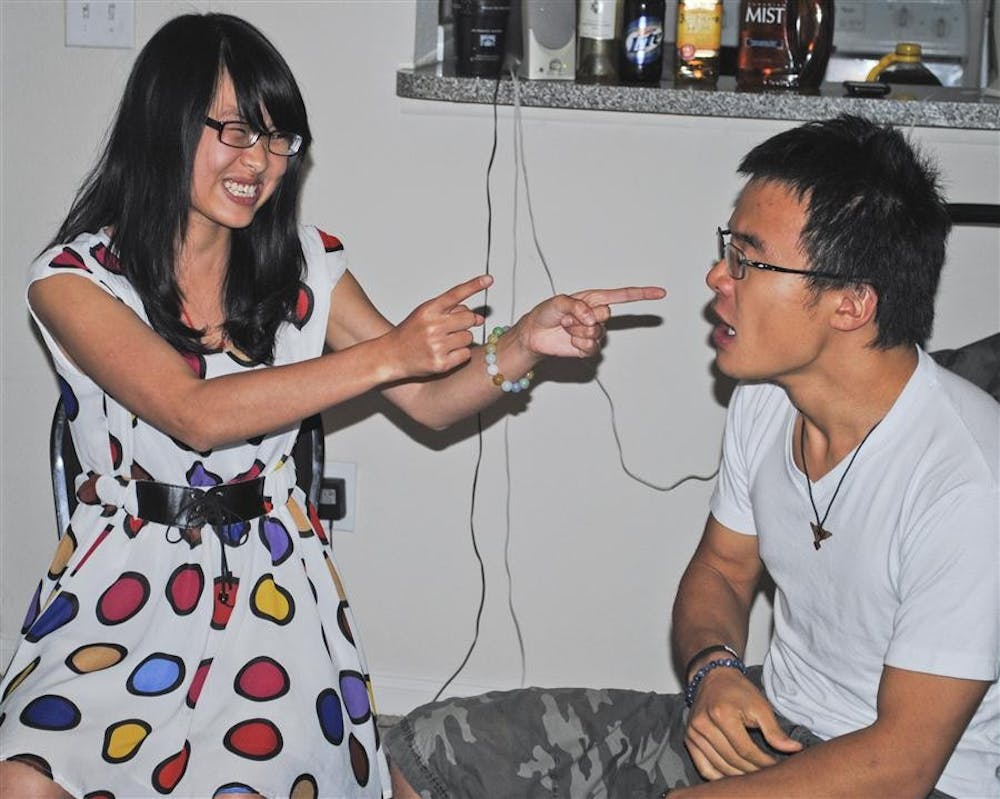Drinking games once had a purpose other than to get players intoxicated as fast as possible.
In fact, some games involving alcoholic beverages date back to Ancient China’s Warring States Period from 475 BCE to 221 BCE. While the games, known as Jiuling in China, were originally introduced to regulate people’s drinking habits, the culture evolved quickly evolved and Jiuling soon encouraged overdrinking.
Now, thousands of years later, international students are still playing some of the same games as the Ancient Chinese emperors.
***
The boy came towards Echo Lu with a small piece of a napkin in his mouth.
A group surrounded the two, shouting and chanting in Mandarin.
“Kiss him! Kiss him!”
Lu steps back. Embarrassed, she looked down and said, “Okay, I drink.”
The other students razz her.
“You can’t do that!”
“You must kiss him!”
Lu takes a sip of wine.
The nine Chinese students in the room at Oasis Chinese Restaurant and Karaoke are among the 5,495 international students attending IU this year, a record enrollment. Chinese students make up the largest group of international students at IU. Ten thousand miles from home, they still enjoy playing Chinese games in dorms, apartments and at restaurants such as Oasis.
Some of the games will sound familiar to Americans, but others, like the napkin in the mouth, won’t.
A guide to the games:
The Napkin Game
The name of the game that Lu, a sophomore from Guilin, and her friends are playing does not have a clear translation into English, but it can be called “the napkin game.”
One person starts out holding the tip of a napkin in their mouth. The next person has to bite onto the napkin and pull it until it tears so that it is in their mouth. Thus it goes down the line. Each time, paper is torn off the napkin until it becomes so small that the last person will have to put their lips so close to the other person’s mouth as to kiss.
“The last boy... I did not want to kiss him. I just kept drinking every time. That’s why I puked,” Lu said.
The Kings
The napkin game isn’t the only Chinese game that can involve kissing. In the kings, players are randomly picked to do a dare.
Beihui Liu, a sophomore from outside of Beijing, said the game is often played at karaoke clubs.
“The winner will ask the loser to leave the room and find the waitress and dance in front of her, or maybe you will have to go to a different room and sing some songs in some strangers’ room,” she said. “Actually, I always lose in this game, but the boys won’t let me do anything too embarrassing.”
Her most embarrassing dare came from one of her girlfriends who asked her to tell a waiter he was handsome.
Did she get his number? “No, I am too shy, so I just drank.”
The Fingers Game
Congregating in a circle, the players of the finger game throw their hands out with a number of fingers extended and simultaneously guess the total number of fingers extended. Whoever is furthest off the mark must drink. Sometimes the players do not just guess numbers but also have to say a phrase with their numbers. “Two kind brothers,” for two, or “three stars shining,” for three, for example.
Fight the Landlord
Fight the Landlord, in Chinese “Dou Di Zhu,” is China’s most popular form of poker. The game came out of the Cultural Revolution period in China when anti-landlord sentiment abounded.
Three players are dealt the entire deck of cards with three cards left face-down in the middle. One player is the landlord, determined by who bids highest on the three cards, and the other two players team up, each player trying to get rid of their cards first by throwing hands. The hands are one card, a pair, three of a kind, straights, full house and four of a kind (a “bomb”). Whoever follows the previous hand must throw the same hand with higher cards. Two of a kind of jokers beats any hand except a bomb. Suits don’t matter, so there is no flush.
This is Chao Tan’s favorite game. The junior from Zhuzhou, Hunan, said she plays once or twice a month in China but only is able to play once every two months while studying in America.
With the challenges of adapting to a new culture, reading textbooks written in their second language and trying to get used to living abroad, Chinese students don’t have as much time to enjoy their native games, but when they do, it’s a welcome reprive from the struggles of American life.
“I often miss China,” Lu said, “But when we play these games, I feel like I am back home for the first time.”
Drinking games from China help students feel at home

Get stories like this in your inbox
Subscribe





